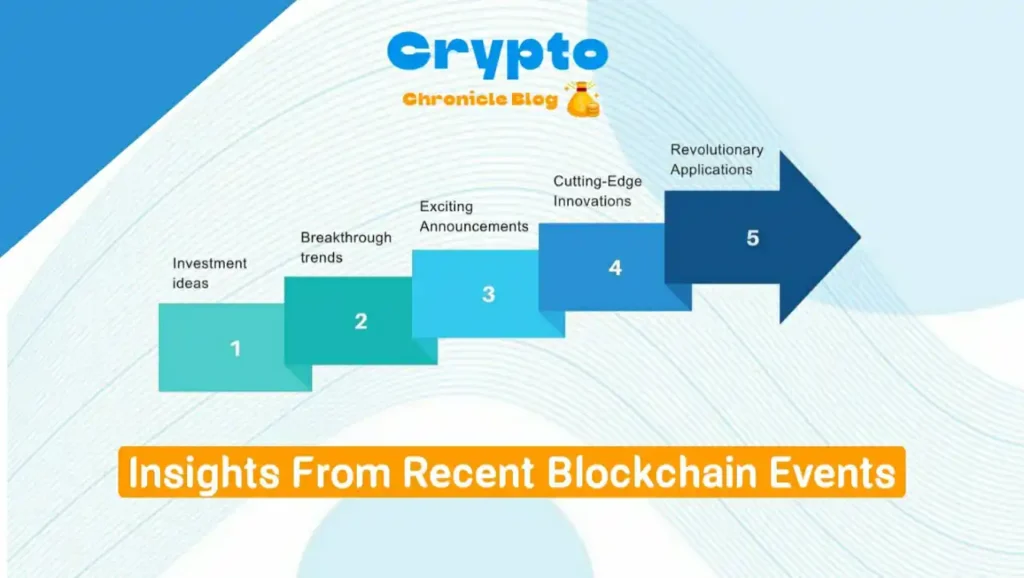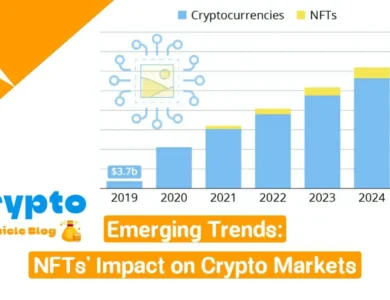Key Insights from Recent Blockchain Conferences and Events
Blockchain technology continues to disrupt various industries, and staying updated with the latest developments and insights is crucial for anyone involved or interested in the field. In this article, we will highlight key insights from recent blockchain conferences and events, shedding light on the advancements, challenges, and potential future trends in the blockchain space.
Embracing Decentralization
Decentralization lies at the core of blockchain technology, and recent conferences have emphasized its importance in various applications. The benefits of decentralization include enhanced security, transparency, and trust by eliminating single points of failure. Speakers and experts have stressed the need to move away from centralized systems and embrace blockchain technology for decentralized applications.
Benefits of Decentralization
- Enhanced security through distributed consensus mechanisms.
- Increased transparency and trust through immutability and public verifiability.
- Reduced dependency on intermediaries and centralized authorities.
Moving Away from Centralized Systems
- Highlighting the limitations and vulnerabilities of centralized systems.
- Advocating for the adoption of blockchain as a decentralized alternative.
- Encouraging industries to explore use cases that leverage the power of decentralized networks.
Advantages of Decentralized Applications
Exploring real-world applications such as decentralized finance (DeFi), supply chain management, and voting systems.
Discussing the potential of decentralized applications to disrupt traditional industries and empower individuals.
Interoperability and Scalability
As the number of blockchain networks grows, the lack of seamless communication between different platforms becomes a pressing challenge. Recent conferences have focused on addressing interoperability and scalability issues to enable blockchain networks to work together effectively.
The Need for Interoperability Solutions
- Highlighting the limitations of isolated blockchain networks.
- Exploring the importance of interoperability for data sharing and collaboration.
- Discussing the potential benefits of connected blockchain ecosystems.
Challenges of Blockchain Network Communication
- Examining the technical hurdles in achieving interoperability.
- Addressing issues of consensus, data format, and smart contract compatibility.
- Evaluating existing interoperability solutions and their limitations.
Cross-Chain Interoperability Protocols
- Introducing protocols like Polkadot, Cosmos, and interoperability-focused blockchains.
- Exploring their role in facilitating communication between disparate blockchain networks.
- Discussing the potential impact of cross-chain solutions on the blockchain ecosystem.
Sustainability and Energy Efficiency
The environmental impact of blockchain technology has raised concerns, and recent conferences have focused on addressing these issues and exploring ways to make blockchain more sustainable and energy-efficient.
Environmental Impact of Blockchain
- Discussing the energy consumption of proof-of-work (PoW) consensus algorithms.
- Examining the carbon footprint of mining operations.
- Raising awareness about the environmental consequences of blockchain technology.
Addressing Sustainability Concerns
- Introducing alternative consensus algorithms such as proof-of-stake (PoS) and delegated proof-of-stake (DPoS).
- Exploring their potential to reduce energy consumption and environmental impact.
- Discussing the trade-offs between security, decentralization, and energy efficiency.
Proof-of-Stake (PoS) Consensus Algorithms
- Explaining the underlying principles of PoS consensus mechanisms.
- Highlighting their advantages, including reduced energy consumption and enhanced scalability.
- Discussing notable PoS blockchain projects and their impact on sustainability.
Energy-Efficient Consensus Mechanisms
- Exploring innovative consensus mechanisms that prioritize energy efficiency.
- Discussing concepts such as proof-of-authority (PoA) and practical Byzantine fault tolerance (PBFT).
- Analyzing their potential to minimize energy consumption while maintaining security.
NFTs and the Metaverse
Non-Fungible Tokens (NFTs) have gained significant popularity, and recent blockchain conferences have delved into their potential and impact. The emergence of the metaverse, a virtual shared space, has opened up new possibilities for NFTs, enabling ownership of virtual assets and experiences.
Popularity and Impact of NFTs
- Examining the rise of NFTs as unique digital assets.
- Discussing their impact on art, collectibles, gaming, and other industries.
- Highlighting notable NFT sales and their implications for creators and investors.
Exploring the Metaverse
- Introducing the concept of the metaverse and its relation to virtual reality and augmented reality.
- Discussing the potential of blockchain and NFTs in creating and governing the metaverse.
- Analyzing the challenges and opportunities presented by the metaverse and its impact on society.
Ownership ofVirtual Assets and Experiences
- Exploring the concept of digital ownership and its application to virtual assets.
- Discussing the role of NFTs in establishing verifiable ownership within the metaverse.
- Examining use cases such as virtual real estate, virtual fashion, and virtual identities.
Implications for Creators, Collectors, and the Ecosystem
- Analyzing the impact of NFTs on creators, providing new revenue streams and empowering artists.
- Discussing the role of collectors in the NFT ecosystem and the evolving market dynamics.
- Addressing concerns around sustainability, copyright, and the democratization of access to digital assets.
Regulatory Developments
Blockchain conferences have also addressed the evolving regulatory landscape surrounding cryptocurrencies and blockchain technology. Government representatives, policymakers, and legal experts have shared insights on the regulatory frameworks being developed to ensure consumer protection, prevent fraud, and foster innovation.
A. Evolving Regulatory Landscape
- Discussing the evolving attitudes of governments and regulatory bodies towards blockchain and cryptocurrencies.
- Highlighting the challenges of regulating a decentralized technology and the need for adaptable frameworks.
- Providing updates on recent regulatory developments in key jurisdictions.
B. Ensuring Consumer Protection
- Examining measures taken to protect consumers from scams, fraud, and misleading practices in the blockchain space.
- Discussing the role of KYC (Know Your Customer) and AML (Anti-Money Laundering) regulations in the blockchain industry.
- Analyzing the potential impact of regulatory frameworks on user privacy and data protection.
C. Preventing Fraud and Fostering Innovation
- Exploring initiatives aimed at combating fraud and promoting transparency in blockchain transactions.
- Discussing the role of regulatory sandboxes and innovation hubs in fostering responsible experimentation.
- Addressing the challenges of striking a balance between regulatory oversight and fostering blockchain innovation.
D. Balancing Regulatory Oversight and Blockchain Innovation
- Examining the potential impact of regulations on blockchain startups and small businesses.
- Discussing the importance of collaboration between regulators, industry players, and blockchain communities.
- Highlighting the need for regulatory clarity to encourage responsible blockchain adoption and development.
Enterprise Adoption
Blockchain conferences have highlighted the increasing interest and adoption of blockchain technology by enterprises. From supply chain management to financial services, companies are recognizing the potential of blockchain for enhancing efficiency, transparency, and security.
A. Growing Interest in Blockchain among Enterprises
- Discussing the factors driving enterprise interest in blockchain technology.
- Examining the potential benefits of blockchain adoption, including cost reduction and process optimization.
- Highlighting industries where blockchain is making significant inroads, such as logistics, healthcare, and finance.
B. Use Cases in Supply Chain Management and Finance
- Exploring how blockchain improves supply chain transparency, traceability, and efficiency.
- Discussing the potential of blockchain in streamlining cross-border payments, trade finance, and asset tokenization.
- Showcasing successful implementations and case studies from leading enterprises.
C. Benefits and Challenges of Blockchain Integration
- Analyzing the benefits of blockchain integration, including enhanced data security, auditability, and automation.
- Discussing the challenges faced by enterprises when integrating blockchain into existing systems and processes.
- Highlighting the importance of collaboration, standards, and interoperability in achieving successful blockchain integration.
D. Successful Implementations and Case Studies
- Showcasing real-world examples of enterprises leveraging blockchain for transformative solutions.
- Highlighting the benefits and lessons learned from successful blockchain implementations.
- Discussing the scalability and future potential of blockchain in enterprise settings.
Privacy and Data Protection
With the growing concern around data privacy, recent conferences have explored privacy-enhancing technologies in the blockchain space. Discussions have centered around zero-knowledge proofs, homomorphic encryption, and other privacy-focused solutions that allow for secure and private transactions while preserving the benefits of transparency and immutability offered by blockchain.
Concerns around Data Privacy
- Discussing the challenges of preserving privacy in a transparent and immutable blockchain environment.
- Addressing the implications of public blockchains on data protection and user anonymity.
- Highlighting the need for privacy-enhancing technologies in blockchain applications.
B. Privacy-Enhancing Technologies in Blockchain
- Explaining zero-knowledge proofs and their role in enabling privacy-preserving transactions.
- Introducing homomorphic encryption and its potential for secure data processing on the blockchain.
- Discussing the challenges and opportunities of implementing privacy-enhancing technologies in blockchain networks.
Zero-Knowledge Proofs and Homomorphic Encryption
- Exploring the cryptographic principles behind zero-knowledge proofs and homomorphic encryption.
- Discussing their applications in blockchain use cases such as private transactions, identity management, and data sharing.
- Analyzing the trade-offs between privacy, scalability, and computational requirements.
Preserving Transparency and Immutability
-
- Addressing the potential tensions between privacy and the foundational principles of transparency and immutability in blockchain.




